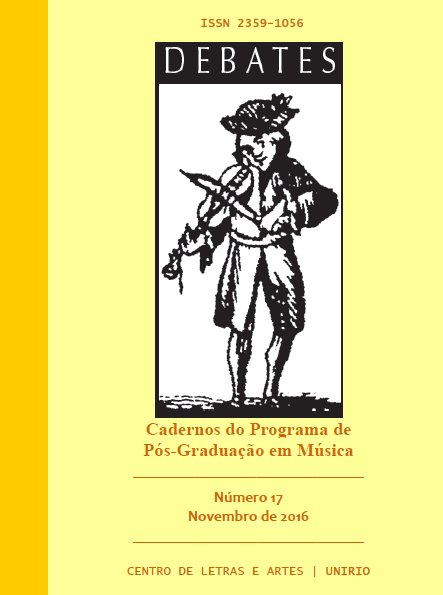A música brasileira e a cooperação intelectual no Congresso de Arte Popular de Praga (1928)
Abstract
17
Resumo: A correspondência de Mário de Andrade, Luciano Gallet, Renato de Almeida e Elsie Houston Péret demonstra que no primeiro semestre de 1928 tanto os três musicólogos quanto a cantora carioca se organizam para participarem de um Congresso de Arte Popular, mote para pesquisas em torno das características de nossos cantos e bailados populares. A consulta ao dossiê brasileiro da extinta Sociedade das Nações indica que além da cooperação intelectual as instituições do pós guerra queriam se afirmar no panorama científico. Os Anais do encontro surpreendem pela pequena representação latino americana no encontro internacional e pelo fato do Brasil figurar através de um texto preparado por Elsie e por uma coleção de objetos musicais indígenas selecionados e enviados por E. Roquette-Pinto. Se a documentação e a bibliografia consultadas elucidam quais as tratativas da política cultural aproximam os países que participaram da primeira guerra, conclui-se, também, que ainda não alcançamos construir um panorama sobre as contribuições individuais de nossos musicólogos e artistas que colheram e estudaram os primeiros cancioneiros.
Palavras chave: musicologia; metodologia de pesquisa; Arte Popular
Brazilian music and intellectual cooperation at the Congress of Popular Art in Prague (1928)
Abstract: The letters of Mario Andrade, Luciano Gallet, Renato de Almeida and Elsie Houston Peret show that the first half of 1928 the three musicologists and the carioca singer organized themselves to participate in a Congress which was called Congress of Popular Art aiming a research around the characteristics of our songbooks. The consultations at Brazilian dossier from the extinct League of Nations indicate that beyond intellectual cooperation the postwar institutions wanted to stablish themselves in the scientific scenario. The proceedings of the meeting surprise by the small Latin American representation at the international conference but also by the fact that Brazil is represented through a text prepared by Elsie and a collection of selected indigenous musical objects sent by E. Roquette-Pinto. If the documentation and consulted bibliography clarify that the discussions of cultural policy connect countries that participated in the first war, it is clear, too, that we have not yet managed to build a picture of the individual contributions of our musicologists and artists who gathered and studied the firsts songbooks.
Key words: musicology; methodology; Popular Art


